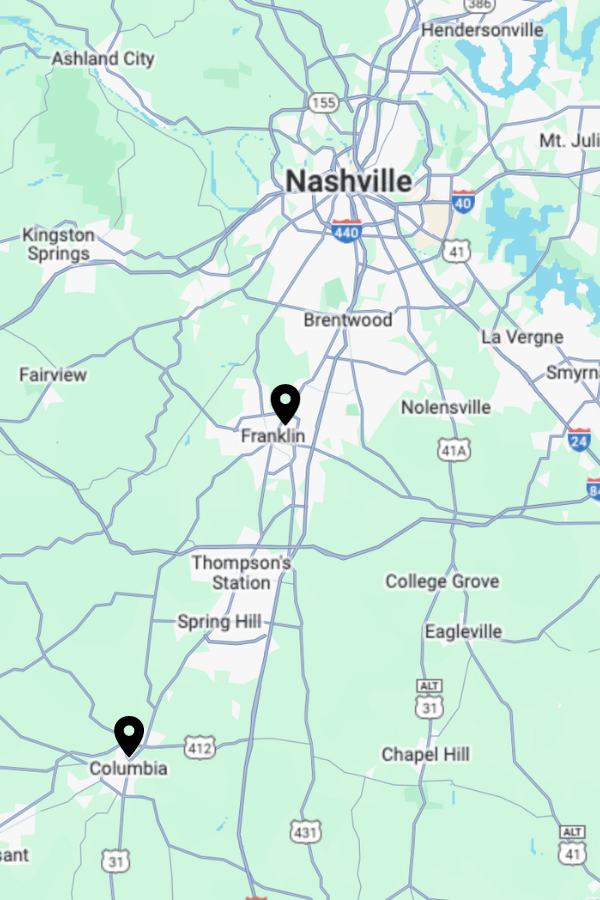Apex Recovery manages multiple rehabilitation centers across Tennessee, providing comprehensive support for people struggling with addiction. With several locations, we offer accessible and personalized treatment programs customized to each client’s needs, creating a supportive environment for recovery and long-term health.
At Apex Addiction Recovery Center, specialized Benzo rehab treatment is available for people grappling with substance abuse, mental health challenges, and dual diagnoses. Our comprehensive approach tackles the intricate interaction between addiction and co-occurring mental health disorders, providing support to inspire holistic healing and sustainable recovery from benzo addiction.

What are the Seven Different Benzodiazepines?
Seven different benzodiazepines commonly prescribed for various medical conditions include diazepam (Valium), alprazolam (Xanax), lorazepam (Ativan), clonazepam (Klonopin), temazepam (Restoril), chlordiazepoxide (Librium), and oxazepam (Serax). Each benzodiazepine has unique pharmacological properties, such as onset of action, duration of effect, and potency, which influence their clinical use and potential for misuse or addiction.
These medications are primarily prescribed to alleviate symptoms of anxiety, insomnia, muscle spasms, and seizures. However, prolonged or excessive use can lead to tolerance, dependence, and addiction. Therefore, it is crucial for healthcare providers to carefully monitor benzodiazepine use and provide appropriate guidance and support to mitigate the risk of misuse and promote safe and effective treatment outcomes.
What Are Benzos?
Benzodiazepine drugs, or benzos, including Xanax, Klonopin, and Valium, are prescription medications that can easily lead to dependence. Because patients find they need higher and higher doses, they often become addicted within a matter of weeks.
Generally, benzodiazepines are prescribed for stress, anxiety disorder, insomnia, panic attacks, and other similar disorders. They can also be prescribed as part of drug addiction rehabilitation. They fall into two categories: short-acting drugs or fast-acting, such as Xanax, Ativan, and Halcion, and long-acting drugs or slow-acting, like Valium, Klonopin, and Librium.
The way they act is they provide the body with a feeling of calm. Unfortunately, the body responds to them by shutting down the natural mechanisms for sedation and that’s why it is so easy to get dependent on benzos.
The intensity, duration, and type of symptoms vary from one case to another, but they follow some general characteristics. First of all, it depends on what type of benzo the patient was using, how much, and for how long. Short-acting benzos, like Xanax, can produce rather intense and serious withdrawal symptoms. As a result, a Xanax addiction becomes difficult to overcome. This is because these medications take less time to leave the patient’s body.
Free Addiction Assessment
Schedule a free, confidential assessment with a licensed clinician. Apex Recovery can check your insurance coverage levels for drug and alcohol addiction, and mental health treatment.
What is a Benzodiazepine Addiction Treatment Program?
A benzodiazepine addiction treatment program is a structured approach designed to help individuals overcome addiction to benzodiazepine medications. These programs typically offer a combination of medical interventions and therapeutic modalities tailored to your needs. Treatment may include medical detoxification to safely manage withdrawal symptoms, followed by comprehensive behavioral therapy to address underlying psychological factors contributing to addiction.
Counseling sessions, support groups, and relapse prevention strategies are often integral components of these benzodiazepine addiction recovery programs. The goal is to empower you to achieve sobriety, regain control over your lives, and develop healthy coping mechanisms to prevent relapse, ultimately promoting long-term recovery and improved well-being.
Learning About Benzodiazepine Use Disorder (BUD)
Benzodiazepine Use Disorder (BUD) is a condition illustrated by the compulsive and problematic use of benzodiazepine medications. These drugs, commonly prescribed to treat anxiety, insomnia, and seizures, can lead to dependence and addiction when used beyond prescribed guidelines. Symptoms of BUD include cravings, tolerance, withdrawal upon cessation, and continued use despite ill effects.
Long-term misuse can result in severe health complications, including cognitive impairment and respiratory depression. Treatment typically involves a combination of medical detoxification, behavioral therapy, and benzodiazepine addiction support groups to address both the physical and psychological aspects of addiction, encouraging recovery and improved quality of life.
Statistics on Benzo Addiction in Middle Tennessee
Between 2019 and 2021, Tennessee recorded 1,666 benzodiazepine-positive unintentional or undetermined fatal drug overdoses. Prescription benzodiazepines were found in 80.7% of these deaths, while illicit benzodiazepines were present in 12.0%. Additionally, 45.5% of those who died had an anxiety disorder, and 52.3% had a substance use disorder (SUD).
Shockingly, 71.3% of benzodiazepine-positive overdoses involved fentanyl. In 2019, 521 people died from benzo overdose in Tennessee; however, this number surged to 763 in 2020. Nationally, 30.6 million adults reported past-year benzodiazepine use, with 25.3 million using them as prescribed and 5.3 million misusing them, adding to the benzodiazepine addiction rate.
What Happens in Benzo Addiction Treatment?
Benzo addiction treatment helps individuals recover from benzodiazepine dependence or abuse. It involves the use of medications, therapy, and support services in order to help the individual break the cycle of addiction and learn healthy ways to cope with their triggers and cravings. Treatment programs may also include residential care, support groups, and relapse prevention strategies. The goal of the program is to help individuals achieve long-term sobriety and live a healthier lifestyle. Benzo addiction treatment can be an effective way to get your life back on track.
Our benzo rehab program uses behavior modification techniques and support groups to help individuals manage their withdrawal symptoms and learn healthy coping skills. Therapy sessions are also included in the program, which may include cognitive behavioral therapy, motivational interviewing, or dialectical behavior therapy.
Apex Recovery San Diego’s licensed therapists have worked to restore the health of hundreds of patients with benzo dependence. Our prescription drug recovery program doesn’t just treat the addiction. By utilizing a holistic approach, we get to the root of the dependence and treat the physiological causes of illness as well. As a result, our patients are able to break free from their prescription drug addictions. If you need a Valium, Klonopin, or Xanax rehab center, Apex Recovery Tennessee can help you.

- Please complete and send the form below.
- One of our staff members will contact your insurer to check your coverage.
- We will contact you promptly with the results and to discuss the next steps.
Insurance Verification
"*" indicates required fields
Locating Addiction Centers That Offer Benzo Rehab in Tennessee
In Tennessee, people seeking Benzo rehab can find support at addiction centers like Apex Recovery. With locations in Franklin and Columbia, Apex offers comprehensive treatment programs tailored to your requirements. From medical detoxification to therapy and aftercare, Apex Drug and Alcohol Addiction Recovery Center provides a supportive environment for recovery and long-term wellness. Contact us or call at (877) 881-2689 today.
Benzodiazepine Drug Rehab Program in Tennessee (TN)
Apex Addiction Recovery Center in Tennessee has established two facilities in the state to serve those in need of Benzo rehab. Apex Recovery Franklin offers a serene setting for recuperation. Meanwhile, Apex Recovery Columbia, provides another accessible location for those seeking comprehensive addiction treatment.
Apex Recovery Franklin
4601 Carothers Pkwy STE 250A
Franklin, TN 37067
Apex Recovery Columbia
2710 Trotwood Ave STE A & B
Columbia, TN 38401
How To Find an Benzodiazepine Addiction Rehab Facility Near Me
Finding a benzodiazepine addiction rehab facility nearby takes several steps. Here’s a comprehensive guide to assist you throughout the process:
- Evaluate Your Needs: Begin by assessing whether you require inpatient or outpatient treatment. Consider any specific preferences you may have, such as holistic approaches, dual diagnosis treatment, or certain benzodiazepine addiction therapy modalities that align with your recovery goals.
- Utilize Online Search Engines: Conduct searches using keywords like “Benzodiazepine rehab centers near me” or “Benzodiazepine addiction rehab centers in Tennessee.” This can help you identify nearby facilities that offer the services you need.
- Explore Online Directories: Browse through online directories of addiction treatment centers. These directories often provide detailed information about each facility, including their treatment approaches, amenities, and contact details.
- Check Insurance Coverage: Contact facilities like Apex Alcohol and Drug Addiction Recovery Center directly to inquire about coverage for our addiction treatment services. Understanding your insurance coverage can help you narrow down your benzodiazepine addiction rehabilitation options and choose a facility that aligns with your financial situation.
- Verify Accreditation: Ensure that the rehab facility you’re considering is accredited by reputable organizations, such as the Joint Commission or the Commission on Accreditation of Rehabilitation Facilities (CARF). Accreditation indicates that the facility meets high standards of quality and adheres to best practices in addiction treatment.
- Read Reviews: Take the time to read reviews and testimonials from former clients or their loved ones. This can provide insights into the experiences of others who have sought treatment at the facility, helping you make a more informed decision.
- Contact Facilities: Reach out to the rehab facilities you’re interested in to gather more information about their programs, treatment approaches, and admission process. Speaking with staff members can give you a better understanding of what to expect during your treatment journey.
- Visit the Facility: If possible, schedule a visit to the facilities you’re considering. Touring the facility in person allows you to assess the environment, amenities, and overall atmosphere. It also provides an opportunity to meet with staff members and ask any questions you may have about the treatment program.

Learning About the Popular Attractions of Middle Tennessee
Middle Tennessee, in the Volunteer State, has a rich selection of attractions. As the heart of Music City, visitors revel in Nashville’s sounds of blues music, rock ‘n’ roll, and country music. The region’s Appalachian culture and Southern hospitality charm, while history buffs explore Civil War history sites and savor moonshine lore.
From the Tennessee River to the Great Smoky Mountains (aka the Smokies), adventures abound. Don’t miss the Jack Daniel’s Distillery for authentic Tennessee whiskey, Nashville hot chicken, or a stroll down Beale Street. Whether indulging in barbecue culture delights or touring Elvis Presley’s Graceland, Middle Tennessee enchants with its blend of cultural heritage and musical legacy.
Benzo Withdrawal Symptoms
With short-acting benzos, such as Xanax, withdrawal symptoms usually kick in after six to eight hours and may last for up to two weeks. They normally manifest themselves as strong discomfort, anxiety, insomnia, panic attacks, and restlessness. As we said, the body is struggling because it has switched off its natural calming mechanisms. Bodily sensations include sweating and increased pulse rate and blood pressure.
Quitting long-acting benzos, such as Valium, will usually show signs of withdrawal after one to four days. The Valium withdrawal symptoms usually peak around 10 to 14 days after the quit date and fade away after three to four weeks. It is possible that some patients who have used this type of benzos will experience post-acute withdrawal syndrome, known as PAWS, which is a protracted withdrawal that can last from three months up to two years. During PAWS, the patient will feel anxious and worried and might experience bouts of sudden, acute-like withdrawal symptoms months later.
Having a physician for support during detox from prescription drug substance abuse is essential for success. The drug needs to be removed from the patient’s system, but this must be done with expertise and professional knowledge, to minimize the health risks. Lack of supervision is particularly dangerous if seizures or suicidal behavior emerge as part of the detox. If an individual has co-occurring disorders like panic disorder or anxiety disorder, it is especially important to treat all issues during the detox process for long-term recovery. If you need a benzo rehab program, Apex Recovery is here for you.

Can You Tell if Someone is Addicted to Benzodiazepines?
Identifying benzodiazepine addict signs in someone can be challenging, as people may initially use these medications as prescribed. However, over time, dependence and addiction can develop, leading to various signs and benzodiazepine addiction symptoms that indicate a problematic pattern of use. Below are some common signs to look out for if you suspect someone may be addicted to benzodiazepines.
If you observe several of these signs and symptoms in someone, it may indicate a substance use disorder involving benzodiazepines. Encouraging the person to seek professional help from a healthcare provider or addiction specialist is crucial for addressing the addiction and facilitating benzodiazepine addiction recovery.
Increased Tolerance
People may require higher doses of benzodiazepines to achieve the desired effects, as tolerance builds up over time.Withdrawal Symptoms
Experiencing withdrawal symptoms when attempting to cut down or stop benzodiazepine use, such as anxiety, irritability, tremors, insomnia, and even seizures.Preoccupation with Obtaining Benzodiazepines
Spending a significant amount of time and energy obtaining, using, and recovering from the effects of benzodiazepines.Loss of Control
Difficulty controlling or limiting benzodiazepine use, despite experiencing negative consequences such as relationship problems, financial difficulties, or legal issues.Neglecting Responsibilities
Prioritizing benzodiazepine use over responsibilities at work, school, or home, leading to neglect of duties and obligations.Social Withdrawal
Withdrawing from social activities or hobbies that were once enjoyable in favor of using benzodiazepines.Changes in Behavior
Noticeable changes in behavior, such as mood swings, irritability, agitation, or secretive behavior related to benzodiazepine use.Physical Symptoms
Physical symptoms such as drowsiness, confusion, slurred speech, poor coordination, and impaired memory or cognitive function may become more apparent as addiction progresses.Continued Use Despite Destructive Consequences
Despite experiencing adverse effects on physical health, mental well-being, or personal relationships, people may continue to use benzodiazepines compulsively.Doctor Shopping or Prescription Forgery
Engaging in deceptive behaviors to obtain multiple prescriptions for benzodiazepines from different healthcare providers or forging prescriptions to acquire more medication.

Does Health Insurance Cover Benzo Addiction Rehab in Tennessee
Health insurance coverage for benzodiazepine addiction rehab in Tennessee varies depending on the specific insurance plan. Many insurance plans offer coverage for addiction treatment services, including detoxification, therapy, and inpatient or outpatient programs. However, the extent of coverage, including deductibles, copayments, and the types of services covered, may differ among plans.
It’s essential for you to review your insurance policy or contact us at Apex Substance Addiction Recovery Center to understand your coverage options for benzodiazepine addiction treatment. Some insurance plans may require pre-authorization or have specific network providers, so it’s crucial to verify coverage and explore potential financial assistance options. We can check your insurance right now and get you on your way. Call us at (877) 881-2689.
What Are the Health Insurance Providers That Offer Coverage for Benzodiazepine Use Disorder Rehab?
Several major health insurance providers offer coverage for benzodiazepine use disorder rehab in Tennessee. These include Blue Cross Blue Shield (BCBS), Aetna, Cigna, UnitedHealthcare, and Humana. These providers often offer a range of insurance plans with varying levels of coverage for addiction treatment services, including detoxification, therapy, and residential or outpatient programs.
If you’re seeking benzodiazepine addiction treatment, you should analyze your insurance policy or reach out to us at Apex Recovery to understand the specific details of your coverage, including any copayments, deductibles, or restrictions on services.
How Much Do Benzo Treatment Programs Cost in Middle Tennessee Without Health Insurance Coverage?
The cost of benzodiazepine abuse treatment programs in Middle Tennessee without health insurance coverage can vary widely depending on factors such as the type of program, duration of treatment, and level of care provided. On average, outpatient programs may range from $3,000 to $10,000, while residential programs can cost anywhere from $10,000 to $30,000 or more for a 30-day stay.
Detoxification services may incur additional costs, typically ranging from $1,000 to $2,000 per week. It’s essential for people considering treatment to ask about fees and payment options directly from benzodiazepine addiction treatment facilities like Apex, as many offer sliding scale fees or financial assistance programs based on income and need.
What Are Different Types of Benzo Addiction Treatment Programs in Tennessee?
In Tennessee, various types of benzodiazepine addiction treatment programs are available to cater to your diverse needs. These include Partial Hospitalization Programs (PHP), Intensive Outpatient Programs (IOP), residential programs, and specialized benzodiazepine detox programs. Let’s delve into each program to understand their unique features and benefits in supporting you on the path to recovery.
Detox Treatment
Detox treatment for Benzodiazepine Use Disorder (BUD) focuses on safely managing withdrawal symptoms as you discontinue benzodiazepine use. Medical professionals closely monitor patients during this process to ensure their safety and comfort. Detoxification at benzodiazepine detox centers may involve gradually tapering off benzodiazepines under medical supervision or using medications to alleviate withdrawal symptoms, facilitating a smoother transition into further addiction treatment.
Residential Program
Residential programs for Benzodiazepine Use Disorder (BUD) rehab provide 24-hour inpatient care and support in a structured environment. Patients reside at the treatment facility for the duration of their program, participating in therapy, counseling, and activities designed to promote recovery. Residential programs offer a highly immersive experience, ideal for those needing intensive treatment and a supportive, therapeutic community.
Intensive Outpatient Program (IOP)
Intensive Outpatient Programs (IOP) for Benzodiazepine Use Disorder (BUD) rehab offer structured therapy and support without requiring residential stay. Participants attend multiple therapy sessions each week, focusing on recovery skills, relapse prevention, and coping strategies. IOPs are suitable for you if you require intensive treatment but can maintain your daily responsibilities and support networks outside of treatment hours.Partial Hospitalization Programs (PHP)
Partial Hospitalization Programs (PHP) for Benzodiazepine Use Disorder (BUD) rehab offer all-inclusive treatment while allowing patients to reside at home. Patients attend therapy sessions and medical appointments during the day, returning home in the evenings. PHP provides intensive support for those requiring structured treatment but who do not need 24-hour supervision.
Free Addiction Assessment
Schedule a free, confidential assessment with a licensed clinician. Apex Recovery can check your insurance coverage levels for drug and alcohol addiction, and mental health treatment.
Tennessee Rehabilitation Process for Benzodiazepine Addiction Treatment
The rehabilitation process for benzodiazepine addiction treatment in Tennessee typically involves a comprehensive approach addressing the physical, psychological, and social aspects of addiction. People seeking treatment for benzodiazepine addiction can expect to undergo a structured process that includes assessment, detoxification, therapy, and aftercare support. Below is an overview of the rehabilitation process for benzodiazepine addiction treatment in Tennessee.
The rehabilitation process for benzodiazepine addiction treatment in Tennessee is individualized and may vary depending on the specific needs and circumstances of each person. However, by following a structured and comprehensive approach that addresses the physical, psychological, and social aspects of addiction, you can achieve lasting recovery and improve your overall well-being.
Assessment
The rehabilitation process typically begins with a thorough assessment conducted by healthcare professionals to evaluate your medical history, substance use patterns, co-occurring mental health conditions, and treatment needs. This assessment helps determine the most appropriate level of care and treatment approach for you.
Detoxification
For those with benzodiazepine dependence or addiction, detoxification, or detox, may be necessary to safely manage withdrawal symptoms and achieve stabilization. Medical detoxification involves supervised withdrawal under medical supervision, often utilizing medications to alleviate discomfort and reduce the risk of complications.
Therapy and Counseling
Once detoxification is completed, you’ll participate in various forms of therapy and counseling as part of your treatment plan. Behavioral therapies such as cognitive-behavioral therapy (CBT), dialectical behavior therapy (DBT), and motivational interviewing (MI) are commonly used to address underlying issues contributing to addiction, develop coping skills, and prevent relapse.
Medication-Assisted Treatment (MAT)
In some cases, medication-assisted treatment (MAT) may be incorporated into the rehabilitation process to support recovery from benzodiazepine addiction. Medications such as buprenorphine, naltrexone, or acamprosate may be used to reduce cravings, alleviate withdrawal symptoms, and support long-term abstinence.
Dual Diagnosis Treatment
Many people with benzodiazepine addiction also have co-occurring mental health disorders such as anxiety, depression, or post-traumatic stress disorder (PTSD). Dual diagnosis treatment addresses both substance use and mental health issues simultaneously, providing integrated care to promote holistic recovery.
Aftercare Planning and Support
As you progress through rehabilitation, aftercare planning and support become essential components of the treatment process. Aftercare may include ongoing therapy, participation in support groups such as Narcotics Anonymous (NA) or SMART Recovery, and access to community resources to help you maintain sobriety and prevent relapse.

Are There Withdrawal Symptoms from Benzo Use?
Withdrawal from benzodiazepine use can be a challenging and uncomfortable experience, especially for people who have been using these medications regularly or in high doses. As benzodiazepines are central nervous system depressants, abruptly stopping or reducing their use can lead to a range of withdrawal symptoms as the body adjusts to the absence of the drug.
It’s essential for people experiencing benzodiazepine withdrawal symptoms to seek medical attention, as withdrawal can be unpredictable and potentially dangerous, especially in cases of severe dependence. Healthcare providers can provide guidance, support, and sometimes medication to help manage withdrawal symptoms safely and effectively, minimizing discomfort and reducing the risk of complications.
Anxiety
One of the most prevalent withdrawal symptoms from benzodiazepines is rebound anxiety, characterized by heightened feelings of nervousness, restlessness, and unease.Insomnia
Difficulty falling asleep or staying asleep is common during benzodiazepine withdrawal, contributing to overall discomfort and exacerbating other withdrawal symptoms.Irritability
People withdrawing from benzodiazepines may experience increased irritability, mood swings, and emotional volatility as their brain chemistry adjusts.Tremors
Shaking or tremors, particularly in the hands, may occur as a result of benzodiazepine withdrawal, reflecting changes in the central nervous system.Muscle Pain and Stiffness
Muscle aches, pains, and stiffness are common physical symptoms of benzodiazepine withdrawal, often accompanied by tension and discomfort.Headaches
Headaches or migraines may develop during benzodiazepine withdrawal, potentially due to changes in neurotransmitter levels and increased sensitivity to stimuli.Nausea and Vomiting
Gastrointestinal symptoms such as nausea, vomiting, and stomach discomfort are common during benzodiazepine withdrawal and can contribute to overall physical distress.Sweating
Excessive sweating, especially during sleep, is a common withdrawal symptom associated with benzodiazepine cessation.Heart Palpitations
Some people may experience heart palpitations or irregular heartbeats during benzodiazepine withdrawal, reflecting changes in autonomic nervous system activity.Seizures
In severe cases of benzodiazepine withdrawal, particularly with abrupt cessation or rapid dose reduction, seizures may occur as a result of increased excitability in the central nervous system.What Are Different Types of Benzodiazepine Addiction Treatment Medications?
Overcoming benzodiazepine addiction often involves medications that help manage withdrawal symptoms and cravings while supporting long-term recovery. Buprenorphine-Naloxone (Suboxone) and Buprenorphine (Subutex) are partial opioid agonists that can alleviate withdrawal symptoms and reduce cravings, making them effective in treating benzodiazepine addiction.
Methadone (Methadose), a full opioid agonist, may also be used to manage withdrawal symptoms and cravings, particularly in more severe cases. Additionally, Naltrexone (Vivitrol), an opioid antagonist, is sometimes prescribed to help prevent relapse by blocking the effects of benzodiazepines, reducing cravings, and diminishing the pleasurable effects if benzodiazepines are used. These medications are often used in combination with therapy and counseling to provide comprehensive treatment for benzodiazepine addiction and support you in achieving lasting sobriety.
Are There Free Assessments and Testing for BUD in Middle Tennessee?
In Middle Tennessee, people seeking assessment and testing for Benzodiazepine Use Disorder (BUD) can access complimentary services offered by Apex Recovery as part of our admissions process. Apex Recovery provides free assessments to evaluate your substance use history, treatment needs, and goals for recovery.
These assessments are conducted by experienced professionals who tailor treatment plans to address your unique circumstances. By offering free assessments and testing, Apex Recovery helps remove barriers to treatment and provide you with the support you need to begin your journey toward rehab from benzodiazepine addiction.
What is the Benzo Use Disorder (BUD) Admissions Process at Apex Recovery?
The admissions process for Benzodiazepine Use Disorder (BUD) treatment at Apex Recovery follows a structured and client-centered approach. People seeking treatment for benzodiazepine addiction can expect a comprehensive process designed to assess their needs, develop personalized treatment plans, and provide support every step of the way. Here’s an overview of the admissions process at Apex Recovery:
Initial Contact
You or your loved ones reach out to Apex Recovery to inquire about treatment options. During this initial contact, you may speak with an admissions coordinator who gathers basic information and answers any questions about the treatment program.
Assessment and Evaluation
Determine the severity of your benzodiazepine addiction, your treatment needs, and your goals for recovery. This assessment may involve reviewing medical history, substance use patterns, mental health status, and any previous treatment experiences.Verification of Insurance
Determine the extent of benefits available for benzodiazepine addiction treatment. This step ensures that you have a clear understanding of your financial obligations and coverage options before proceeding with admission.Treatment Planning
Apex Recovery’s clinical team collaborates with you to develop a personalized treatment plan tailored to your specific circumstances. This treatment plan may include detoxification, substance abuse therapy, medication-assisted treatment, dual diagnosis treatment, and aftercare planning.
Admission and Intake
You are admitted to Apex Recovery’s program and undergo the intake process. During intake, you complete necessary paperwork, undergo medical screenings, and receive orientation to the treatment program, facility rules, and expectations.Commencement of Treatment
Treatment may involve various therapeutic modalities, counseling sessions, group therapy, medication management, and other evidence-based interventions aimed at promoting recovery and long-term sobriety.Ongoing Support and Monitoring
You’ll receive ongoing support and monitoring from Apex Recovery’s multidisciplinary team of professionals. Regular assessments, therapy sessions, medication management, and participation in support groups help you stay on track with your recovery goals and address any challenges that may arise.
More Info and Stats on Benzodiazepine Use Disorder (BUD) in Tennessee
- Between 2019 and 2021, there were 1666 benzodiazepine-positive unintentional or undetermined fatal drug overdoses in Tennessee
- Prescription benzodiazepines were identified in 80.7% of these deaths
- Illicit benzodiazepines were identified in 12.0% of deaths
- 45.5% of those who died had an anxiety disorder
- 52.3% of those who died had a SUD
- 71.3% of benzodiazepine-positive overdoses involved fentanyl
- 521 people died from benzo overdose in 2019 in TN
- In 2020, that number rose to 763
- 30.6 million adults (12.6%) reported past-year benzodiazepine use in the U.S.
- 25.3 million (10.4%) used benzo as prescribed
- 5.3 million people in the U.S. (2.2%) misused benzodiazepine
- Misuse accounted for 17.2% of overall use

